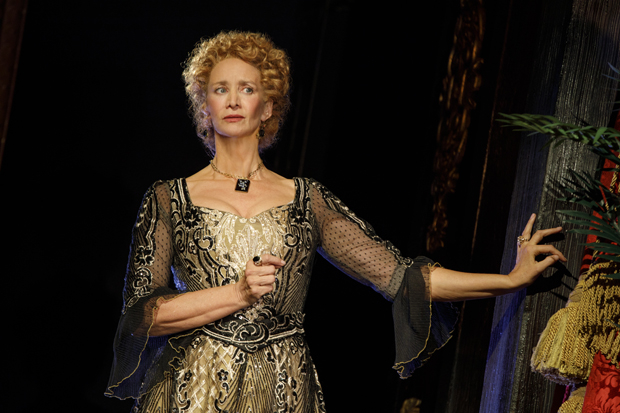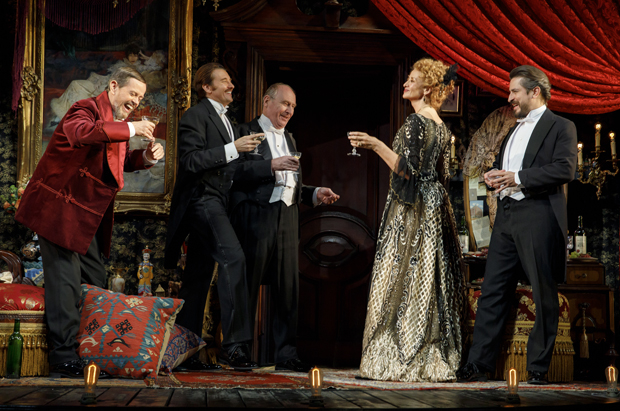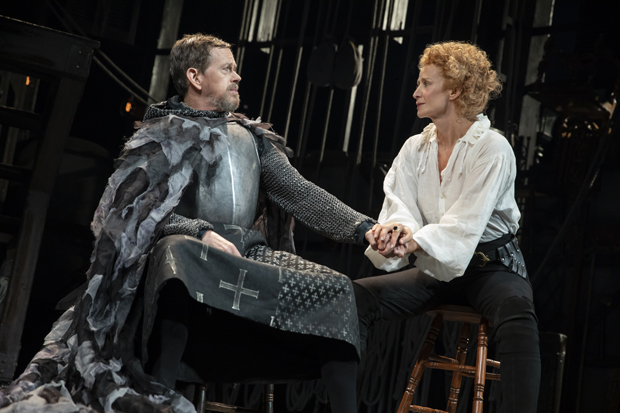Janet McTeer and Theresa Rebeck Talk Sarah Bernhardt and Hamlet

(© Joan Marcus)
Theresa Rebeck's Bernhardt/Hamlet, now playing at Broadway's American Airlines Theatre, is a fictionalized backstage look at the real-life onstage event that found famed 19th-century actor Sarah Bernhardt taking on the title role in Shakespeare's Hamlet. Following Bernhardt and her compatriots as they navigate the politics of gender and creativity, the world-premiere production stars Tony winner Janet McTeer, taking on the title roles as she embodies the woman who was perhaps the most famous actor of all time.
Building the character of Sarah Bernhardt was far from straightforward, mused Rebeck and McTeer during a recent conversation. Instead, it was a process that involved scaling a mountain of diverging biographical information and getting cozy with historical ambiguity: "A lot of people say she was a congenital liar," said Rebeck. "I'm not sure about that, but I think there's a certain fluidity around the truth, and people were very concerned about that. But that leaves a kind of mystery about certain aspects of her life which I found powerful and intriguing."

(© Tricia Baron)
This interview has been condensed and edited for clarity.
What was casting and rehearsal like for Bernhardt/Hamlet?
Theresa Rebeck: It wasn't really until very late in the writing process that I thought, "Who on earth could play her?" It did need to be somebody mighty and very much a stage creature, because Sarah really inhabited that world. She was known to be sort of an incandescent stage star. Luckily Janet was interested in doing it and she was the first person we all agreed it should be sent to.
Janet McTeer: When we were in rehearsal, I had a little list of the ways in which Sarah Bernhardt and I were similar and the ways in which we were different. We're both perceived to have ridiculously astonishing amounts of energy and yet when she was tired, she used to have to take herself off and collapse, and so do I. When she was passionate about something, that energy could keep her going and keep her going and keep her going until she dropped.
Tell me about the process of getting into Sarah Bernhardt's head.
Janet: Once I knew that we were doing it, I holed myself up in my house in Maine and I read several biographies. I enjoyed everybody's different takes on her — people draw different conclusions. And then reading her autobiography, I enjoyed learning about the things that she left out.
Theresa: She knew how to be a celebrity before anybody knew how to do it. And there are moments in the writing that I feel strongly deliver that for me. Like when she says at the beginning, "If I'm one of the most famous people in the world, it's not because my ego has failed me." I feel like she takes these enormous leaps of ego and confidence over a sea of uncertainty, which was partly what attracted me to writing about her. She's someone, like Joan of Arc, who I just admire deeply — the courage and the vulnerability stand right next to each other.
Janet: Even though a lot of people say she was a publicity person, she was also intensely private. She had a little coterie of friends and loved ones around her who she remained totally loyal to all her life. We don't know that much about them. When you're trying to play somebody like, those contradictions that are very interesting to refer to and to look at what everybody says about her. So I have my own personal conclusions that I drew from what I read and the things that she left out of her personal writings.
Theresa: She was famously generous with those she loved. She would throw huge dinner parties and pay for everything. She married a louse, divorced him, and then he came back at the end of his life and she nursed him until he died. So there is this kind of remarkable loyalty and generosity which I think both Janet and I admired tremendously.

(© Joan Marcus)
Are there modern topics that this play can better address because it's a historical piece?
Janet: Certainly from the actor's point of view when you're playing it, because it is a historical piece, you blindside your audience, so by the time you get to the end and you have a political theme that the audience wasn't expecting, consequently perhaps the audience is more open to it. It's a little more surprising. People always say, "Ah, I had no idea it was going to go there." That's always very satisfying.
Were there things about this play that weren't obvious until you put it in front of an audience?
Theresa: I think it's about where we've come as a culture: the real applause around the mightiness of seeing a woman stand up and claim this gigantic moment, taking Hamlet on and saying, "I will not disappear into the benevolent Gertrude, I'm going to keep going." There was a real rush of joy to see how ready the audience was to hear this story.

(© Joan Marcus)










